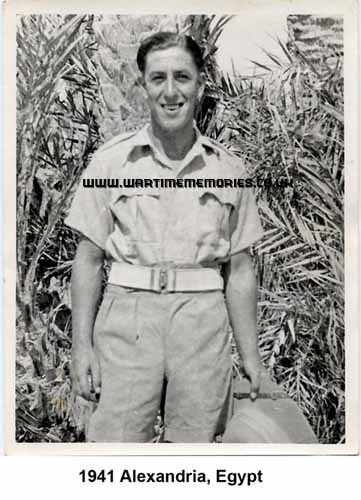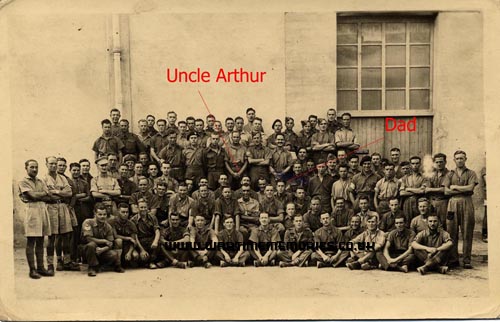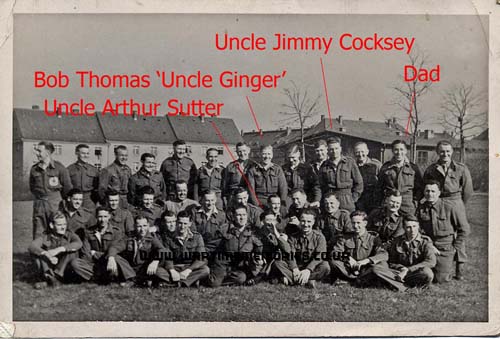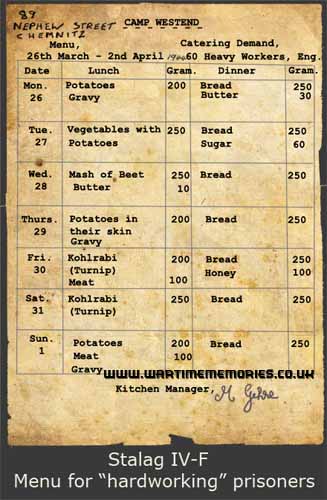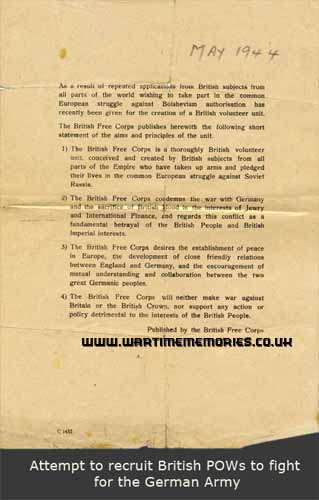LBdr. John Kitchener Sutter
British Army 68th Medium Regiment Royal Artillery
from:Everton, Liverpool
My Father, Lance Bombardier Jack Sutter of the Royal Artillery, was prisoner number 229287 in Stalag IV-F, Chemnitz, Germany. Like so many other veterans he rarely spoke of his wartime experiences, even when asked directly. A snippet here, a story there, were the fragments of a greater story that I never heard.
On 25th April 1939 Jack signed up for 4 years in the Territorial Army. He was posted in the rank of ˜Gunner" to the 59th (4th West Lancashire), Medium Regiment, Royal Artillery, Territorial Army. When the regiment was split he was transferred to 68th Medium Regiment, RA. His Regiment fought all over North Africa; in Libya, Egypt, Eritrea, Sudan and Ethiopia. In June 1942, Jack was fighting the German forces at Tobruk. On 20th June, Rommel launched a massive attack against the Allied Forces and the following day the beleaguered troops surrendered.
The captured Allied soldiers were taken prisoner by the Italian Army and transported to Campo PG 70. Campo 70 was in a village up in the hills and five miles inland from Porto St.Georgio on the eastern coast of Italy. The camp was a disused factory of some sort with eight huge buildings like aeroplane hangars or warehouses standing in a large field. The camp was surrounded with high barbed wire fencing about twelve feet high and every twenty yards or so a sentry box, high up overlooking the compound. All around the inside of the camp was a tripwire about ten feet from the actual wire; anyone entering this area would be shot.
In September, Italy surrendered and the Allied prisoners were virtually free as the guards had fled. However, a message was received from the British High Command saying it would cause confusion if the men tried to move south to join them, and the men were ordered to remain in the camp and wait for our forces to arrive. For several weeks the men fended for themselves until one morning they discovered that German parachutists had dropped around the camp and a machine gunner was in every sentry box and the men were once again prisoners.
A couple of days later the men were informed they were to be taken to Germany. They were marched to some railway sidings where there was a long train of cattle trucks and the men were crowded into them with 40 or 50 men to a truck. There was not enough room to lie down so they had to either stand or squat on the floor leaning back to back. There were 2 buckets in each truck, one for drinking water and the other to be used as a lavatory. For 7 days and 6 nights the prisoners travelled in these conditions across Italy and into Germany. During this nightmare journey many men died of heatstroke and dehydration before arrival at their final destination, Stalag IV-F, Chemnitz, Germany.
Stalag IV-F at Hartmannsdorf near Chemnitz. It was a huge camp with several thousand prisoners of different nationalities. The camp seemed unprepared for new arrivals and they were penned in a compound until the next day. The morning after their arrival at Stalag IV-F, the Germans began processing the prisoners in groups of a hundred. Their heads were shaved and they were deloused and then showered.
The rations issued by the Germans were meagre, and varied slightly from camp to camp. Jack managed to keep a copy of a weekly menu for the camp, dated 26th March to 2nd April 1944. These rations were for the "Schwerarbeiter", the 'Hard Workers' those working the 72 hour week! The main meal was served for lunch and consisted of potatoes and vegetables except for two days a week when 'meat' was included. Dinner was simply a piece of bread. (This menu, together with reproduction meals can be found in the Archives section of my website.
It appears that the Germans had not yet given up hope of losing the war as they were actively trying to recruit British Prisoners of War to fight for them! Amongst Jack's POW memorabilia is a letter to all POWs asking them to join the British Free Corps (BFC), to fight the Russians. It also states that the British Free Corps; "...condemns the ...sacrifice of British blood in the interests of Jewry and International Finance..." The German people may have fallen for it, but the POWs certainly didn't and it has been reported that the British Free Corps had at most 59 volunteers amongst the many many thousands of British POWs.
Jack's official records state that after his release from Stalag IV-F, he arrived back in the UK on 14th May 1945. Safely back home in Liverpool for Jack the war was over, and on 29th November 1945 he was released from service with the Royal Artillery. Although like thousands of others he is classed as 'Reserve' just in case war should break out again. His reserve status lasted until May 1947 when he joined the Territorial Army.
For those of you who may be interested in this period I have produced a website which covers my Father's wartime experiences and has pages on both PG70 and Stalag IV-F. I have recreated Jack's War using his own words, photographs and records, together with material trawled from the Internet and Regimental Histories. In addition to the recreation of the prisoner menu you can find, a manifest for the evacuation of Royal Artillery prisoners from Cheminitz, instructions regarding the issuing of cigarettes, the leaflet asking prisoners to join the BFC, a 1943 group photo of prisoners in PG70, a letter to the commandant of Stalag IV-F requesting transport to collect Red Cross parcels, and even a home-made football pools coupon and a photo of the Lager Commander Unter Officer Fakelman. Forgive me if I have made any historical or geographical errors, they are a result of my lack of knowledge and not intentional.
